Way before the denigrating cinematic term “chick flick” there was the “woman’s picture.” It was a catch-all for gloriously soapy melodramas where females were the main focus of the movie. It was similarly a put-down, but since then film historians have elevated the directorial work of such greats who did these types of films like Douglas Sirk; Delmer Daves and John Brahm. I admit the minute I see those cascading, falling diamonds during the credits of Imitation of Life I am in a state of bliss. What I also like is the theme songs, and, while, some of these films had memorable, melodic instrumental title sequences that were later made hits by singers who added lyrics (A Summer Place), I still prefer it when the theme song is sung (with lyrics) in the movie, especially if they can work the title into the song. Here are a few of my all-time favorites (and if click on the title you will also get to share their melodic joy).
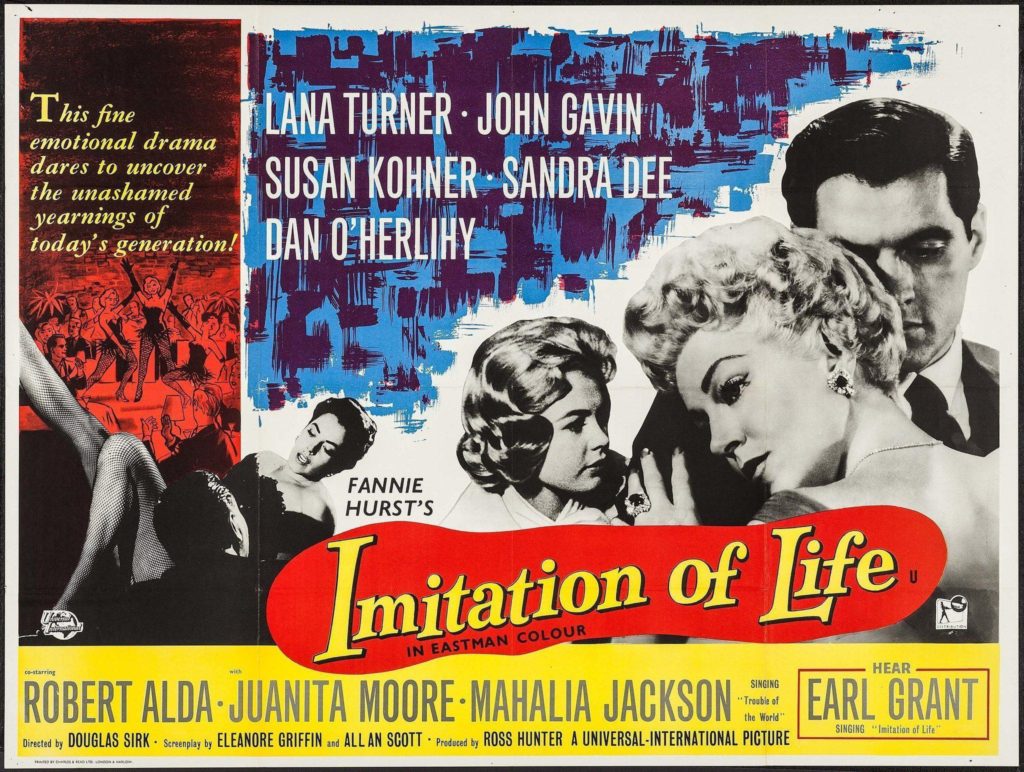
Imitation of Life (Earl Grant) Douglas Sirk’s last Hollywood movie is one of his greatest. Starring Lana Turner as spoiled movie star Lora Meredith and Sandra Dee as her troubled daughter. Juanita Moore is heartbreaking as Lora’s long-suffering best friend Annie Johnson and Susan Kohner as her daughter who passes for white. Sirk’s baroque use of mirrors and windows frame this 1959 masterwork. Earl Grant’s deep, melodious voice sets the stage during the raining diamonds credit sequence. “What is love without the giving, without love you’re only living, an imitation, an imitation of life.” (I still recall, to my eternal mortification, playing this title theme at a close friend’s apartment repeatedly one night while I was heartsick and mental).
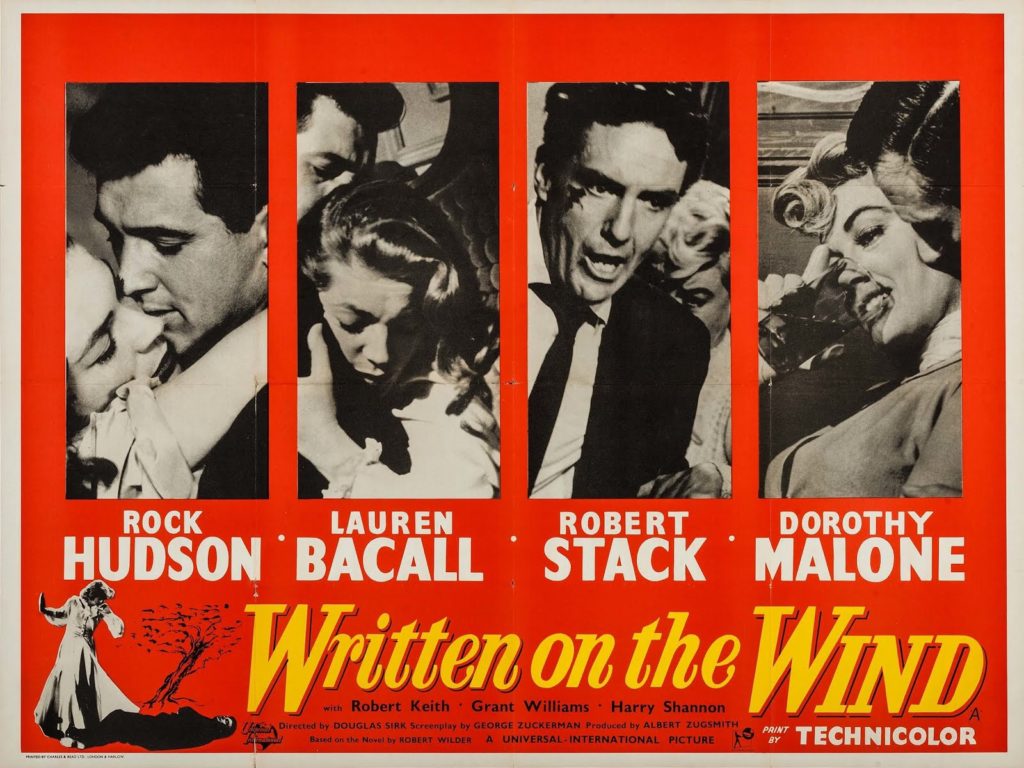
Written on the Wind (The Four Aces) Douglas Sirk’s torrid melodrama about the children of a Texas oil tycoon- Kyle (Robert Stack), an alcoholic playboy and his nymphomaniac sister Marylee (Dorothy Malone, who won an Oscar for her fiery performance). Rock Hudson plays Kyle’s long-suffering best friend Mitch, a geologist for the oil company, and Lauren Bacall rounds out the cast as Kyle’s unhappy wife. The memorable opening sequence with the camera roving over a shooting incident at a mansion, replete with blowing autumnal leaves and the harmonious Four Aces singing the moody theme song. “A faithless lover’s kiss is written on the wind…”
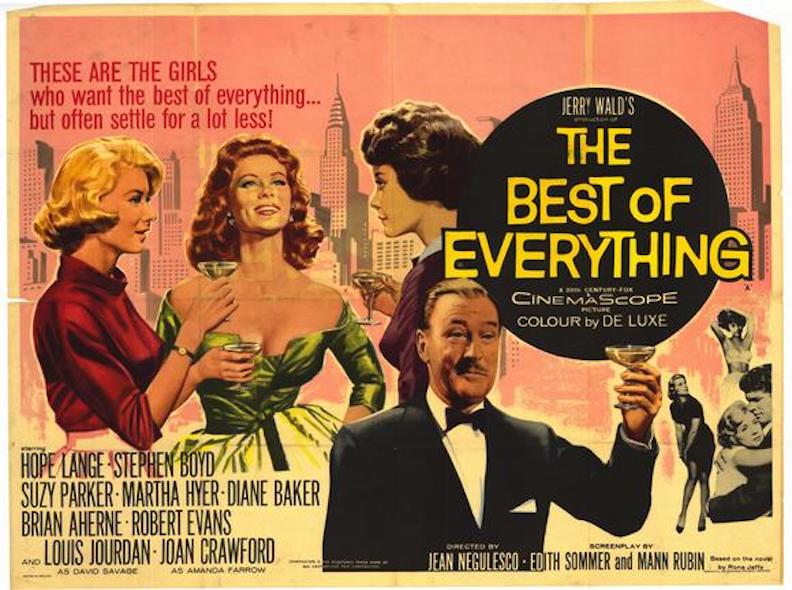
The Best of Everything (Johnny Mathis) 1959 20th Century Fox melodrama (based on a best-seller by Rona Jaffe) about an ambitious fiction editor (Hope Lange) who lands a job at a prestige publishing house, locks horns with a bitch boss (Joan Crawford, of course) and moves into a Greenwich Village apartment with two co-workers (Suzy Parker and Diane Baker). The New York cityscape and shots of women arriving off buses and subways for work is romantically accompanied by the dulcet tones of Johnny Mathis singing “That one little sigh is treasure, you cannot buy or measure, by any means, the best of everything.”
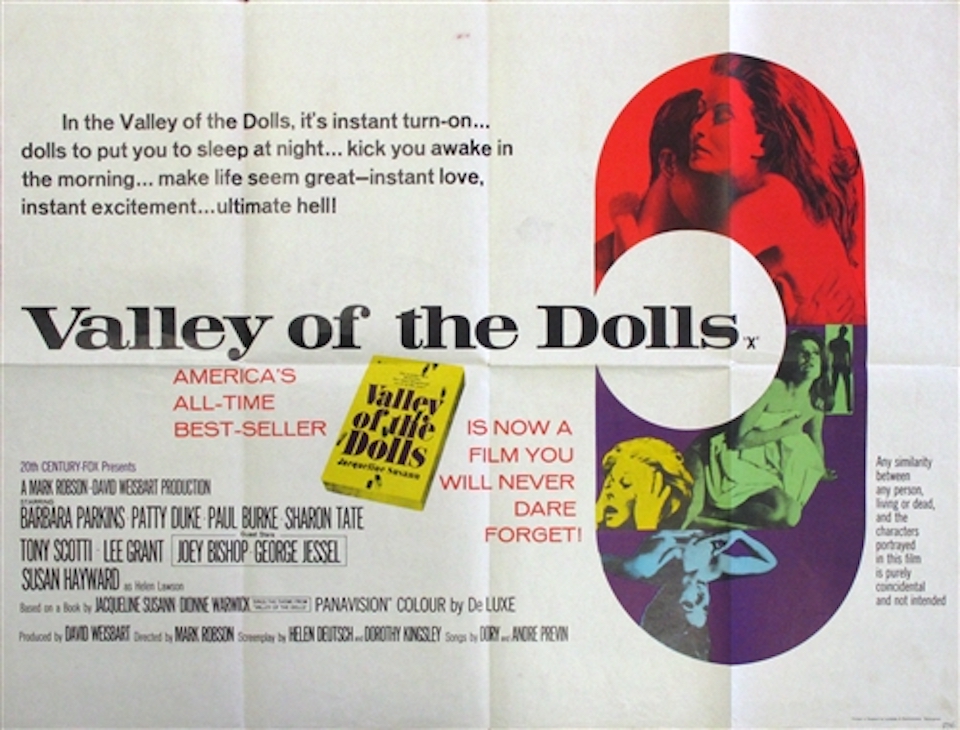
Theme from Valley of the Dolls (Dionne Warwick). Based on the notorious Jacqueline Susann best seller about three women’s rise in the entertainment business and the hazards of pill popping is indescribably, inadvertently hilarious right from the beginning credits with Barbara Parkin’s character Anne, leaving her bucolic country home and heading by train to the big bad city of New York with Dionne Warwick wailing in the background “Gotta get off, gotta get off of this merry-go-round.”
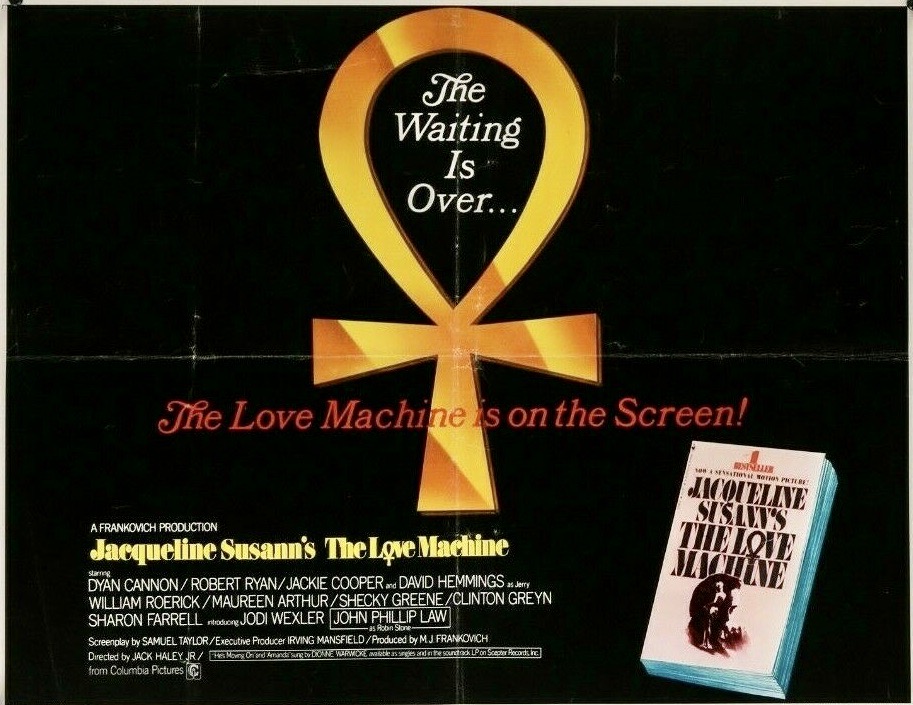
The Love Machine (Dionne Warwick) Jacqueline Susann novels make the best bad movies. John Phillip Law plays Robin Stone a womanizing TV newscaster, who beds his boss’s (Robert Ryan) wife (Dyan Cannon), and cheats on his model girlfriend (Jodi Wexler) so frequently she finally commits suicide. He beats up a hooker for calling him a closet queen and Dyan Cannon gets hysterical (laughing) and threatens to tell everyone when she finds a lovey gold slave bracelet on her gay photographer friend (David Hemmings) from Robin, in a raucous finale that will leave you in stitches. But not to fear- as Dionne Warwick sings, “Robin Stone, oh, oh Robin Stone, he’s moving on, that’s Robin Stone, he’s moving on.”
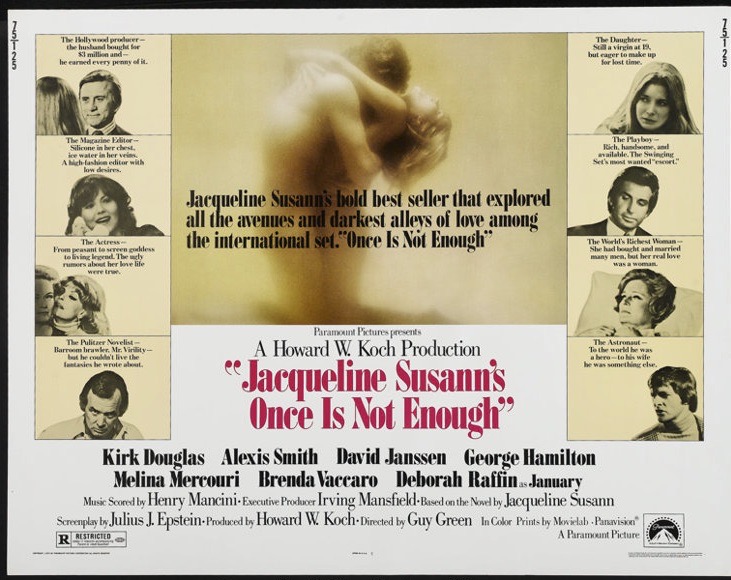
Once is Not Enough (The Mancini Singers) Why does every Jacqueline Susann movie end with a woman walking? This one has Deborah Raffin as January Wade (God I miss Susann’s character names), the spoiled daughter of an aging Hollywood director (Kirk Douglas) she has a rather inappropriate relationship with. “I hope they think you’re a dirty old man and I’m your broad,” she says to her dad when they embrace at the airport. He marries a wealthy heiress Diedre Milford Granger (Alexis Smith) for security, much to his daughter’s displeasure. And Diedre is secretly romancing a Greta Garbo-like actress (Melina Mercouri). January goes to work for her friend’s (Brenda Vaccaro) glossy woman’s magazine and romances an impotent he-man author (David Janssen), bringing back his manhood. He eventually dumps her with, “You gave a middle-aged guy his last pretense of being a stud. For that I’ll always be grateful.” So, poor, lonely January wanders the streets of Manhattan at night while the Mancini Singers croon, “I tasted love just once, but once is not enough.” No kidding.
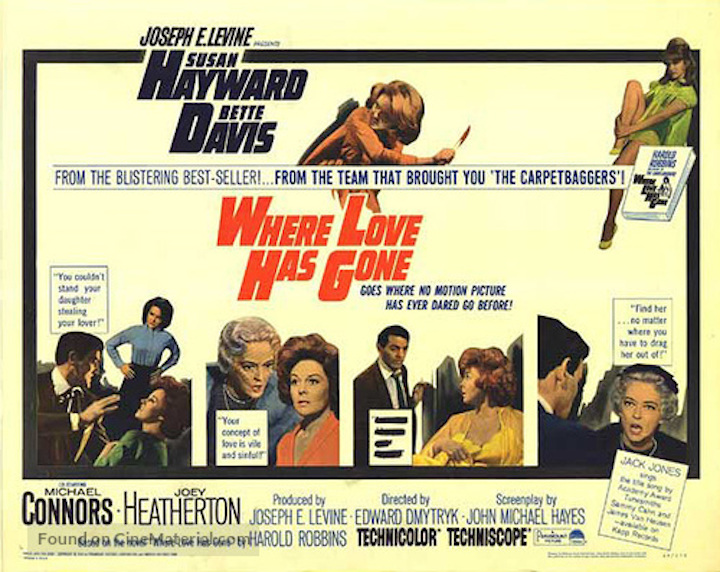
Where Love Has Gone (Jack Jones). Harold Robbins obviously based this novel on the Lana Turner scandal of the murder of her lover (and gangland enforcer) Johnny Stampanato by her daughter Cheryl Crane. Susan Hayward is a famous sculptor, who gets inspiration when she sleeps with lots of strangers. An art critic (DeForrest Kelly) says, “With you sex and art go hand in hand. Sculptor…pagan…alleycat.” Bette Davis plays her haughty, society mother and Mike Conners plays her long-suffering war-hero husband who finally snaps and says to his wife, “You’re not a woman- you’re a disease!” Joey Heatherton her petulant, neglected daughter, on trial for the murder of one of Hayward’s boyfriends in this howler of a film. In a tune by Sammy Cahn and James Van Huesen, Jack Jones sings, “I want to be there, there with you, where love has gone. To that bright and shiny world, where love has gone. To that gone forever world, where love has gone.”
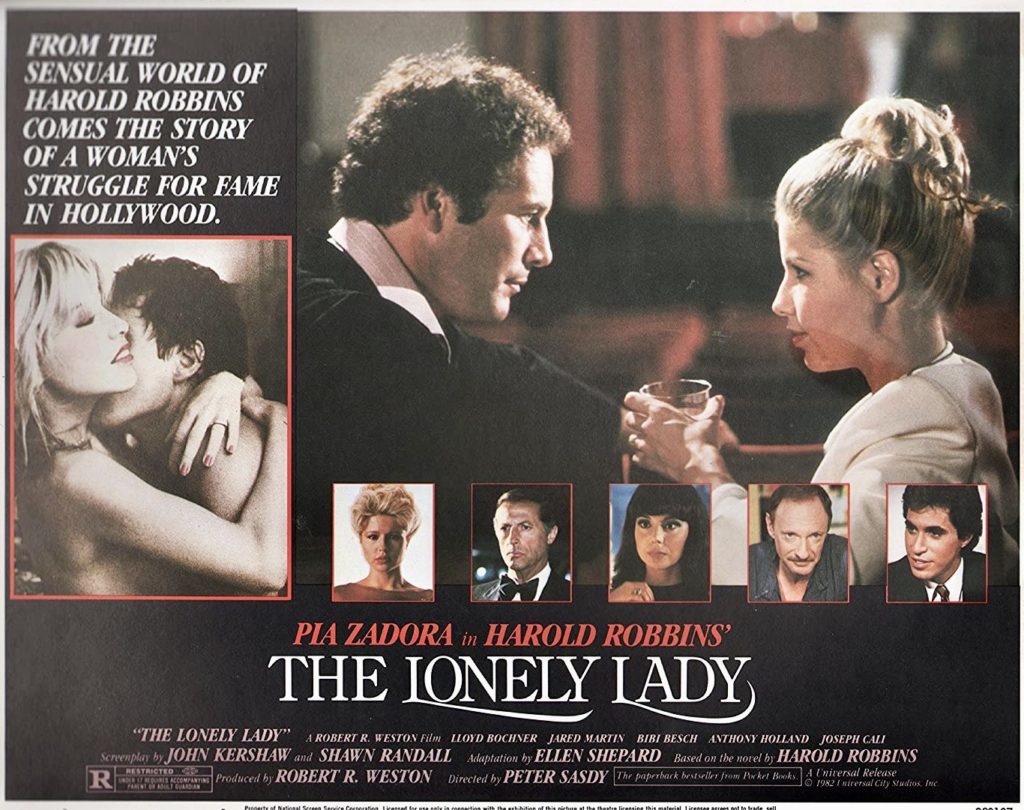
The Lonely Lady (Ellis Hall Jr.) Harold Robbins wrote the ludicrous best-seller about a Hollywood screenwriter (Pia Zadora), used by men in tinsel town (and in her youth) who eventually has a complete nervous breakdown. Her flip-out scene in the shower is hilarious. She is dragged off to the loony bin and diagnosed, “She was suffering from paranoia and hallucinations, induced by tranquilizers, cocaine, amphetamines, alcohol.” But a typewriter is her salvation and she writes an Award-winning script that lets her rip Hollywood in a riotous acceptance speech. She storms away from the ceremony, triumphant. The Tom Jones-sounding Ellis Hall Jr. sings out “Lonely lady, only you can help yourself. Lonely lady, like a ladder to the stars, I know it’s not that far.” Cole Porter this is not.
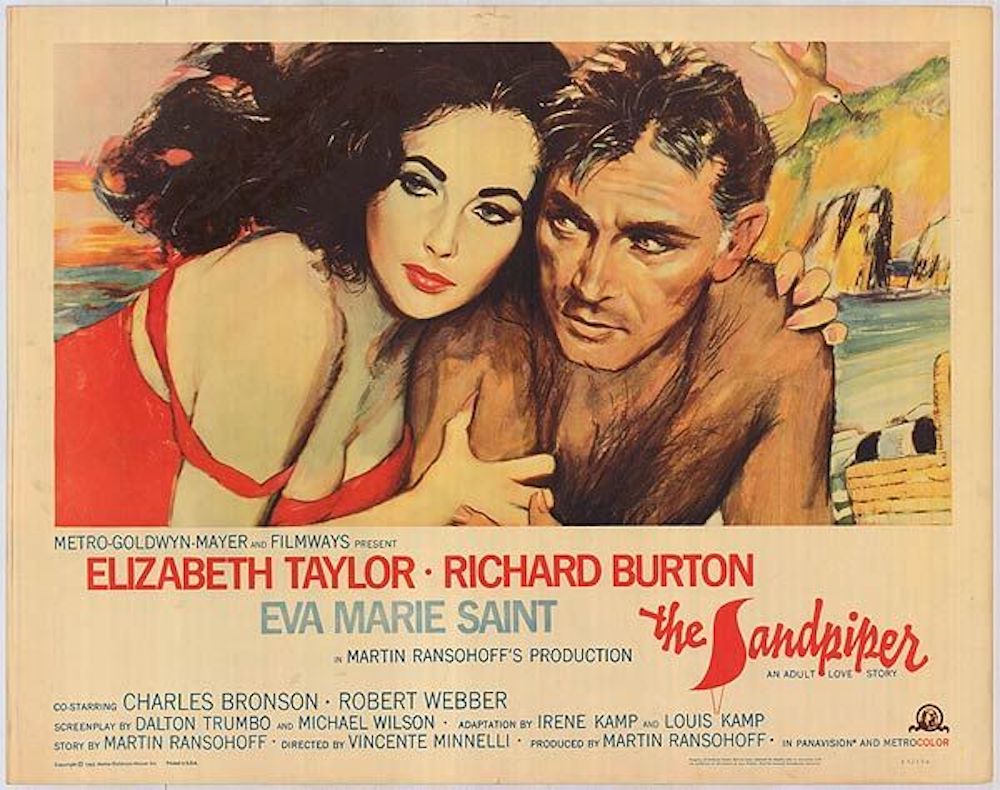
The Sandpiper (Johnny Mandel) Elizabeth Taylor plays an unconventional artist who lives at a beach house at Big Sur who homeschools her young son until he runs afoul of the law. She is forced to send him to an Episcopal school run by a very married Reverend Richard Burton, who succumbs to her kaftans and free-spirited ways and they begin a torrid affair. While nicely filmed by director Vincente Minnelli, it’s really incredibly stupid, but so much fun. The theme song probably should be: When Sand Gets in Your Pants. Johnny Mandel’s song The Shadow of Your Smile, with lyrics by Paul Francis Webster, was made famous by many singers including Andy Williams, Barbara Streisand and Tony Bennett, but the chorus singing the theme in the film is uncredited. “Now when I remember spring, all the joy that love can bring, I will be remembering the shadow of your smile.”
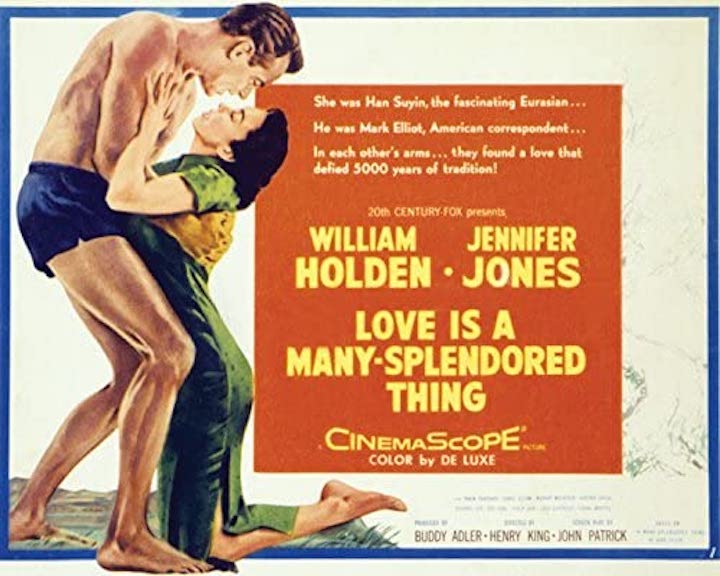
Love is a Many Splendored Thing (Matt Monro) Set in the British Crown Colony of Hong Kong in 1949, handsome William Holden plays Mark Elliot, an unhappily married journalist, who falls for a widowed Eurasian doctor (Jennifer Jones) in this sublimely sappy tragic romance. They have a meeting place on a hill up behind the hospital where she works and when a butterfly lands on his shoulder she thinks it’s a good omen. Mark says, “There is nothing fair nor unfair under heaven. God has been good to us…” (Um, well, not so good as it turns out ). The theme by Sammy Fain & Paul Francis Webster soars throughout, but an uncredited heavenly choir seems to screech to the heavens at the end. “Once on a high and windy hill, in the morning mist, two lovers kissed and the world stood still. Then your fingers touched my silent heart, and taught it how to sing. Yes, true love’s a many-splendored thing.” (I admit I couldn’t find the end credits so here’s Matt Monro).
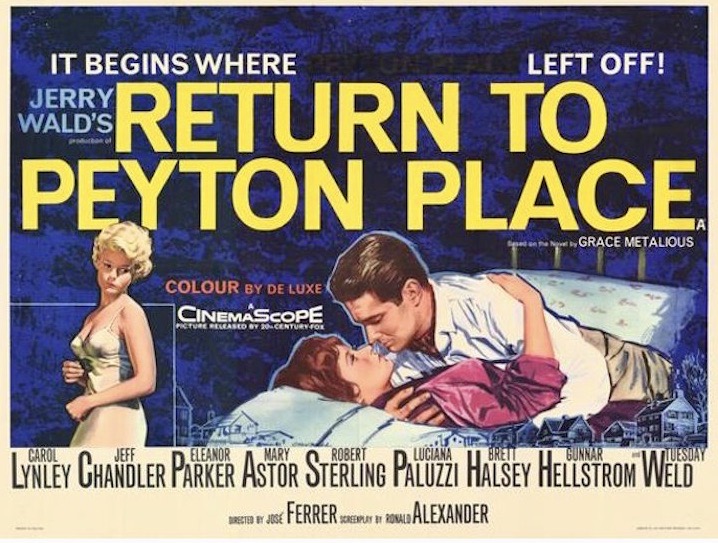
Theme from Return to Peyton Place (Rosemary Clooney). Well, actually not one of the cast members returned from the original blockbuster film Peyton Place (based on the notorious best seller by Grace Metalious about the underbelly of a small New England town). In the new cast, Carol Lynley plays Allison MacKenzie, who is forced to return to her hometown when her salacious best seller is banned and removed from the town library. She is ironically having a love affair with a married man (publisher Jeff Chandler) just like her own unwed mother (Eleanor Parker) did. Jose Ferrer directed the film, which is probably why his wife Rosemary Clooney sang the theme song. “They say that the seasons are four. But you and I know there are more. And best of them all, is the one that we call, the wonderful season of love.”
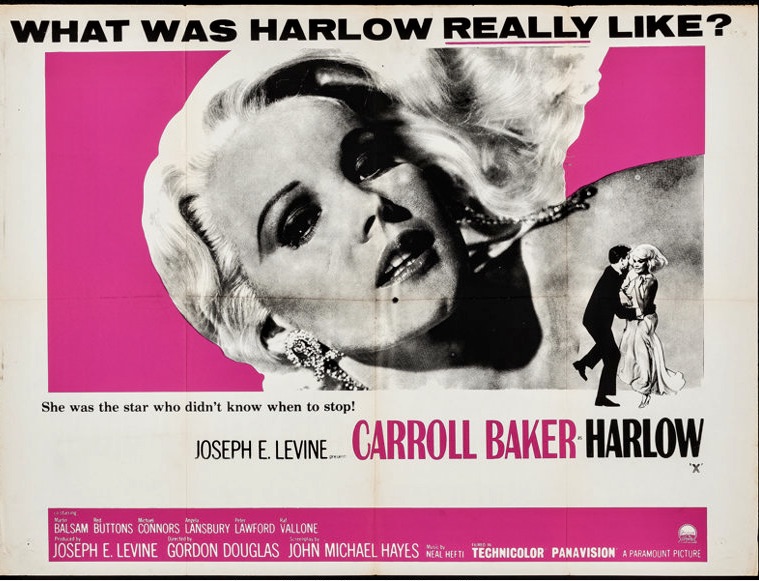
Theme from Harlow (Bobby Vinton) Joseph E. Levine’s bombastic bio-pic of tragic Hollywood star Jean Harlow (played to the hilt by Carroll Baker). Angela Lansbury plays Harlow’s weak-willed mom, married to a sexy loser (Raf Vallone) who delights in spending Harlow’s money when she becomes a big star. Peter Lawford plays the doomed producer Harlow marries who kills himself because he can’t get it up. Harlow dies tragically young and her agent (Red Buttons) grumbles, “She didn’t die of pneumonia, she died of life!” Bobby Vinton sings her epitaph, “Lonely girl in silk and satin, love has never known you. Lonely girl all dressed in sadness, love will never own you.”
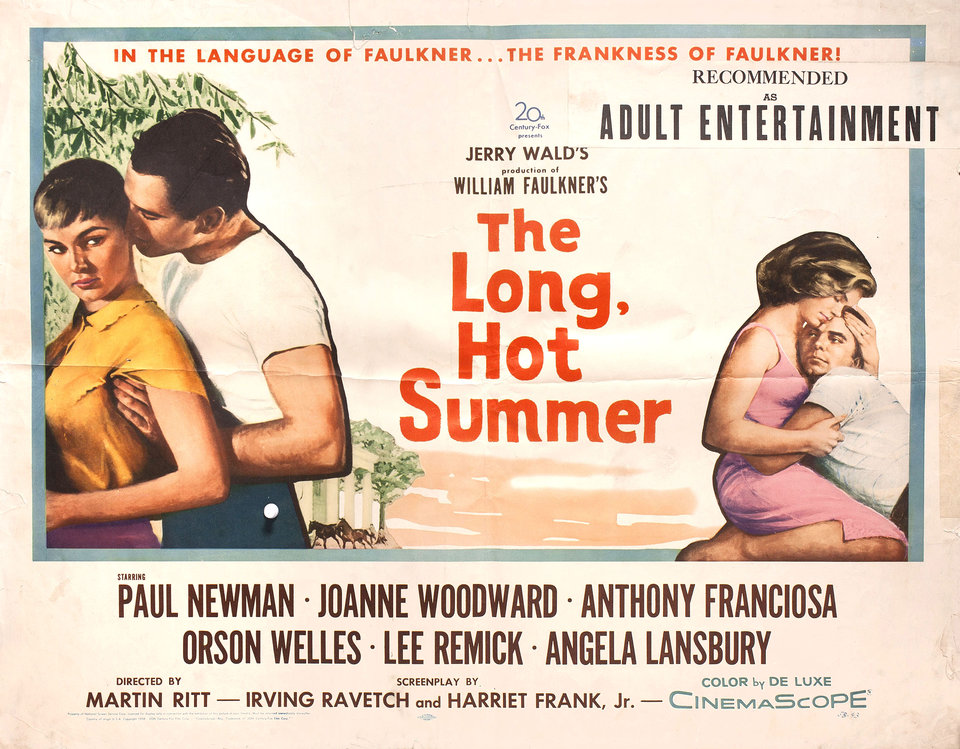
The Long Hot Summer (Jimmie Rodgers) Orson Welles plays the wealthy tyrant Will Varner, who rules a Southern town and his own meek daughter Clara (Joanne Woodward) who he calls, “the best looking old maid in the country.” Into their lives rolls sexy drifter and supposed arsonist Ben Quick (Paul Newman at his hunkiest), who lights the fire of Clara, and the approval of Varner who demands they get married and produce a male heir. Clara is resistant until Ben tells her, “The world belongs to meat-eaters, Miss Clara, and if you have to take it raw, take it raw.” Boy, now that’s romance! Supposedly based on William Faulkner’s The Hamlet. Jimmie Rodgers sings the theme. “The long hot summer, seems to know what a flirt you are. Seems to know your caress isn’t mine to possess, how could someone possess a star?” Yes, how could they?
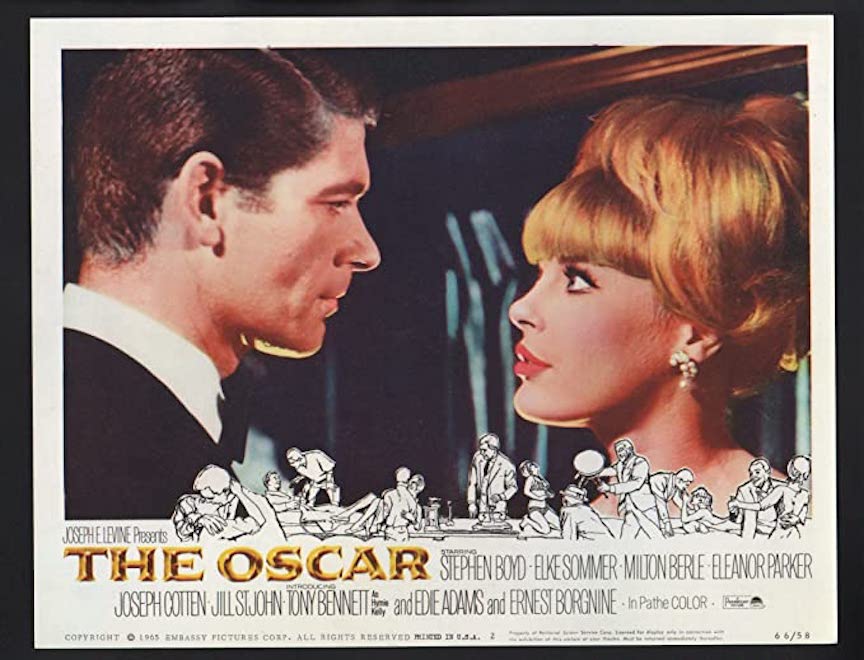
The Oscar (Tony Bennett). Gloriously laughable 1966 film about a Hollywood cad- Frank Fane (Stephen Boyd), Tony Bennett has the unenviable job of playing Fane’s put-upon manager Hymie Kelly. Frank is a womanizer (Jill St, John, Elke Sommer, Eleanor Parker), but a movie studio mogul (Joseph Cotton) sees his potential, “Once in a while you bring me meat like this. It all has different names: prime rib of Gloria, shoulder cut of Johnny. Meat.” And before long Fane’s fame rises. Eventually Hymie washes his hands of his old friend. “You lie down with pigs, you come up smellin’ like garbage,” he warns Fane. Bennett gets to sing the catchy theme. “Maybe September, I’ll love again. Maybe a rainbow will catch me then.”
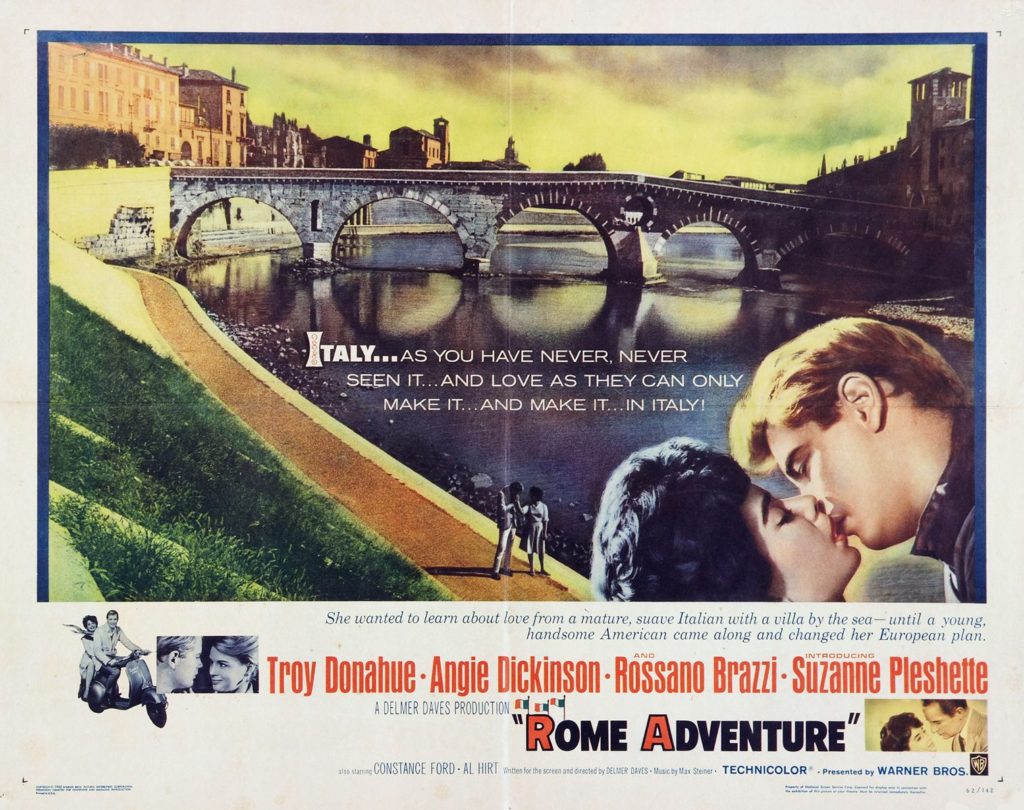
Rome Adventure (Emilio Pericoli) The one interesting thing that came from this sudsy international romance directed by Delmer Daves is that stars Suzanne Pleshette and Troy Donahue married shortly afterwards (however short-lived that was). Pleshette plays a librarian at a woman’s college who gets fired and announces to the uptight faculty board, “I’m going to where they know what love’s about- Italy!” She gets romanced by an older European (Rossano Brazzi), but loses her heart to teen heartthrob (at the time)- Troy Donahue, just dumped by his worldly girlfriend (Angie Dickenson). Then it’s romantic pasta dinners and when a crooner sings the theme song “Al Di La,” the tune follows them everywhere. “Al di la means you are, far above me, very far. Every star will light, the way above me, to where you are.” That earworm even blares in the background during a romantic reunion on the docks of New York where Troy is waiting with roses and rhymes: “Out of the blue I flew. I love you.” He’s a poet and he don’t know it.
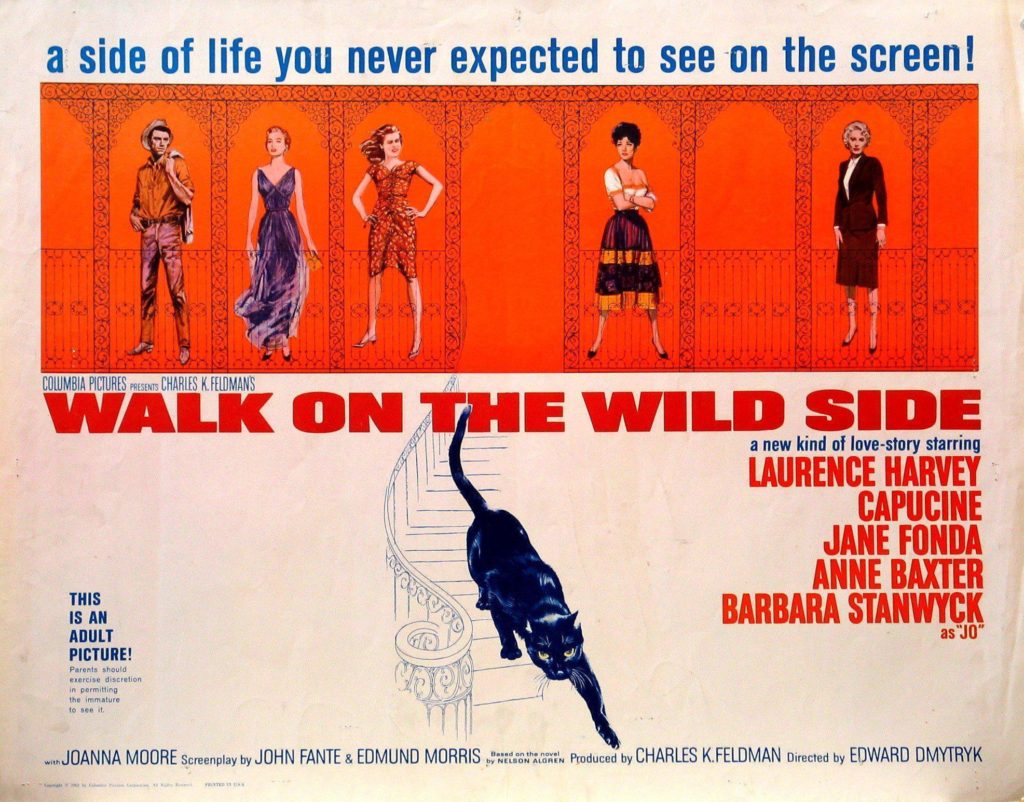
Walk on the Wild Side (Brook Benton). Vaguely based on a Nelson Algren novel, this over-the-top potboiler is about Dove Linkhorn (Laurence Harvey) traveling to Louisiana to find the love of his life Hallie (Capucine). What he doesn’t know is that Hallie’s a high-priced prostitute in a cat house run by a butch lesbian (Barbara Stanwyck) who has a yen for her. Anne Baxter plays a widowed half-breed diner owner, and Jane Fonda is great as sexy vagrant turned prostitute Kitty Twist. With one of the best credit sequences (by Saul Bass) with a cat stalking the dark alleys of New Orleans and Brook Benton singing, “You walk on the wild side, the Devil is waitin’, he’s waitin’ to take your hand. You walk on the wild side, you’re walkin’ with Satan, away from the promised land. One day of prayin’ and six nights of fun. The odds against going to heaven six-to-one.”
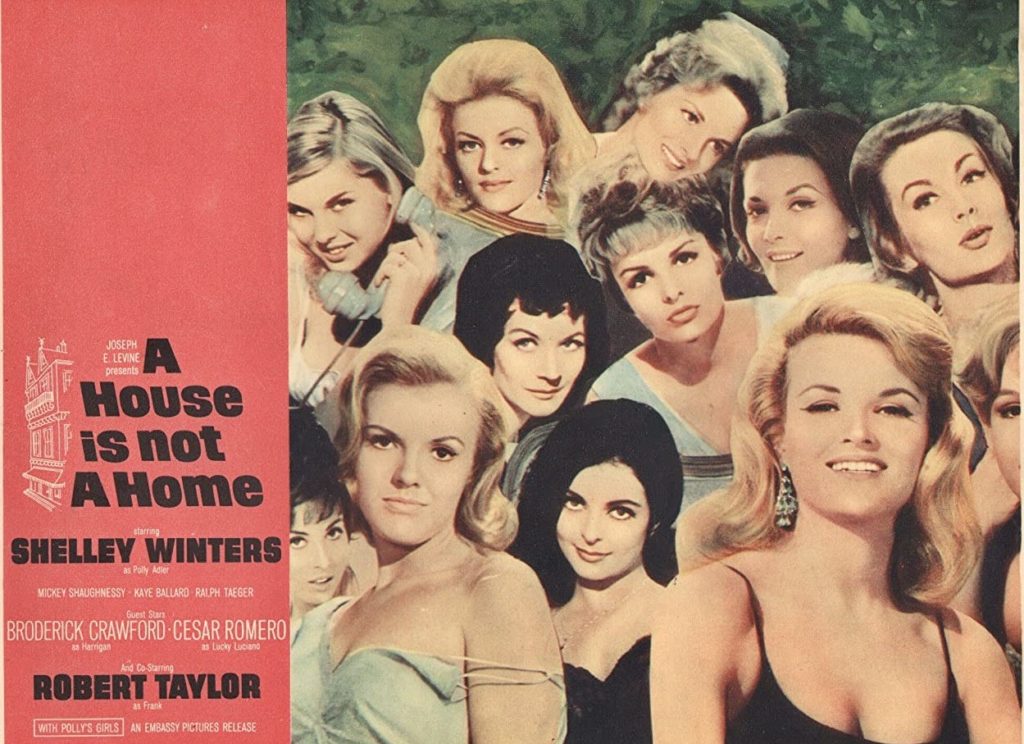
A House is Not a Home (Brook Benton) Speaking of whorehouses, this film is based on the autobiography of notorious New York City madam Polly Adler (played by Shelley Winters). Adler is working in sweatshops when she gets tangled up with gangsters, providing them with great arm candy by paring them with pretty girlfriends of hers. This leads to her managing a high-class Park Avenue bordello in the Roaring Twenties. She has feelings for a musician but is frightened to reveal what she does for a living. Raquel Welch made her film debut as a call girl and Edy Williams (Beyond the Valley of the Dolls) is another “lady of the night” The theme by Burt Bacharach and Hal David became a huge hit. “A room is still a room, even when there’s nothing there but gloom. But a room is not a house and a house is not a home, when the two of us are far apart, and one of us has a broken heart.” I don’t know about you, but that seem like odd lyrics for a movie about hookers.
Any time I hear any of the theme songs it just makes me want to reach the shelf to take the movies down and watch them over again. I remember screening Valley of the Dolls for a friend who had never seen it. Halfway through, he asked, “How can you like this? It’s trash.” I looked over, incredulous that anyone could not experience the intoxicating, giddy joy of watching Patty Duke flush Susan Hayward’s wig down a toilet at a big Broadway party. There was nothing I could do but throw his coat and bag out the window and ask him to leave. So, sit back and enjoy. And if you don’t like it, you are no longer a friend of mine.


Well, I must be your very best friend because I love all of this shit !
Dennis thank u this is heaven!!
I am constantly searching online for ideas that can facilitate me. Thanks!